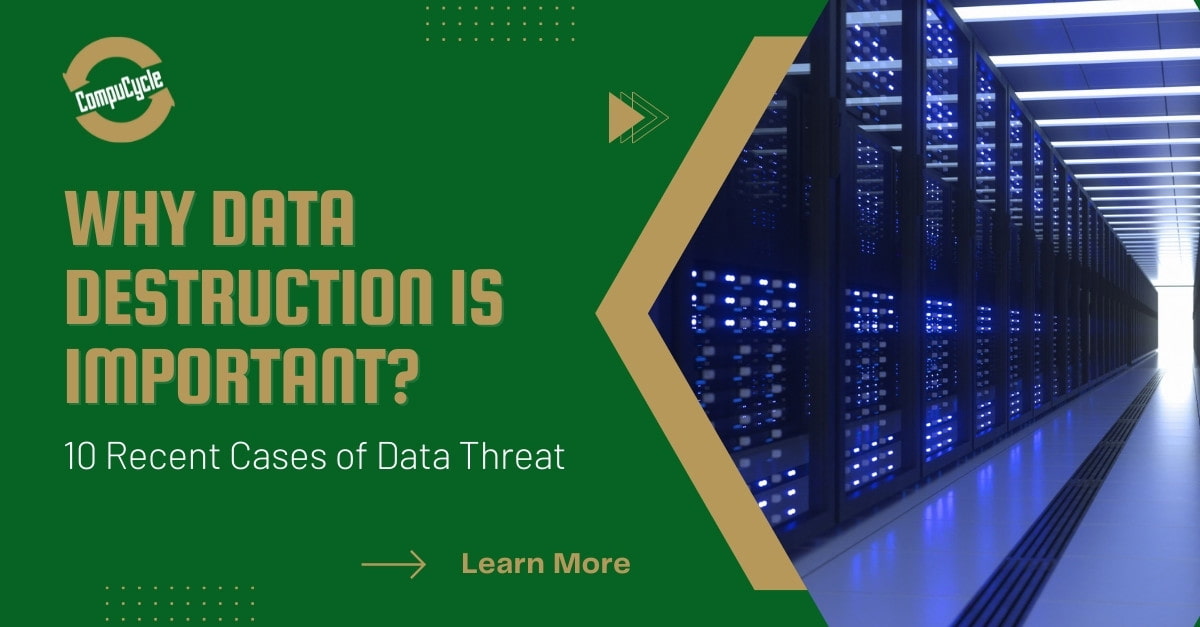Vital Cyber Security Practices for Effective Data Destruction Techniques
Vital Cyber Security Practices for Effective Data Destruction Techniques
Blog Article
The Vital Nature of Information Devastation in Upholding Computer System Safety And Security Services and Protecting Against Unauthorized Gain Access To
In an age where data breaches and identity theft are significantly prevalent, the significance of reliable data destruction can not be overemphasized. Organizations needs to identify that the failing to properly deal with delicate info presents not only lawful and economic dangers however likewise a prospective disintegration of customer count on. Various techniques, from data cleaning to physical damage, work as important safeguards against unapproved access. Understanding the implications of data destruction techniques and compliance with guidelines elevates crucial inquiries about the adequacy of current techniques and their long-term practicality in the face of progressing dangers.
Value of Information Destruction
In a significantly electronic world, the importance of information destruction can not be overstated. As organizations accumulate large amounts of delicate info, the possible repercussions of falling short to appropriately handle and dispose of that information come to be significantly severe. Data violations, identification theft, and business espionage pose considerable hazards, underscoring the requirement of efficient information destruction methods.

In addition, as modern technology develops, so too do the approaches whereby harmful actors seek to make use of sensitive details. Organizations should stay watchful and aggressive in their information destruction techniques to secure against these evolving hazards. By focusing on data destruction, business not just secure their assets but additionally foster count on among clients and stakeholders, showing a dedication to accountable data management and safety and security practices.
Approaches of Effective Information Destruction
To guarantee the permanent and total destruction of sensitive information, companies can use a range of reliable approaches customized to their specific demands. One of one of the most typical approaches is data wiping, which involves making use of specialized software to overwrite existing data numerous times, making recuperation essentially impossible. This is particularly valuable for solid-state drives and hard drives, where typical deletion approaches are inadequate.
Another efficient strategy is degaussing, which utilizes strong magnetic areas to interfere with the magnetic domain names on storage space media, rendering the data irretrievable. This approach is particularly fit for magnetic storage space gadgets, such as tape drives and hard drives.
Physical destruction is likewise a feasible option, entailing the shredding, crushing, or incineration of storage space devices. This approach guarantees that data can not be recuperated, making it suitable for organizations taking care of very delicate details.

Conformity With Data Protection Regulations
Organizations should not only concentrate on reliable information damage approaches yet likewise ensure conformity with information defense policies that govern exactly how sensitive information is managed and dealt with. Complying with these regulations is vital for maintaining and securing individual data client depend on. Regulations such as the General Data Defense Law (GDPR) in the European Union and the Medical Insurance Mobility and Accountability Act (HIPAA) in the USA impose rigorous standards on information monitoring, which consist of requirements for the secure disposal of delicate info.
To accomplish conformity, organizations should implement extensive data devastation plans that align with these lawful structures. This consists of determining information that needs destruction, establishing procedures for secure methodsâEUR" such as shredding physical media or making use of software that satisfies market requirements for information wipingâEUR" and keeping in-depth documents of devastation activities. Regular audits ought to be carried out to guarantee adherence to why not try this out these policies and to recognize any possible areas for improvement.
Failing to abide with data defense policies can bring about considerable legal ramifications, consisting of large penalties and damages to an organization's track record. As a result, incorporating conformity into information destruction practices is not only a lawful commitment but likewise a crucial element of a robust information security approach.
Consequences of Poor Data Handling
Poor data handling can cause serious repercussions that expand past prompt functional problems. Organizations might encounter substantial monetary losses due to information breaches, which commonly result in visit this website expensive removal efforts, lawful charges, and governing penalties. These economic implications can stress resources and hinder growth, eventually affecting a company's profits.
Furthermore, bad data handling can significantly damage an organization's credibility. Stakeholders, partners, and customers might shed rely on an entity that stops working to shield sensitive information, causing decreased client commitment and potential loss of company possibilities. This disintegration of count on can take years to restore, if it can be brought back in all.
Additionally, companies could encounter lawful implications arising from non-compliance with data defense guidelines. Such violations might cause charges and examinations, intensifying the monetary problem and further staining the organization's picture.
In the world of cybersecurity, poor information monitoring techniques can develop susceptabilities that make systems much more at risk to unauthorized accessibility and cyberattacks. Eventually, these effects highlight the essential relevance of carrying out robust information handling treatments to protect sensitive details and keep business stability.
Finest Practices for Secure Information Disposal


Firstly, information need to be classified according to its level of sensitivity. Delicate info requires more rigorous disposal methods, such as shredding physical records and making use of innovative software program for digital information wiping. Using certified information damage services makes sure conformity with sector policies and criteria.
Second of all, organizations need to apply a data disposal plan that mandates normal audits. This plan needs to lay out the procedures for information retention and damage, making sure that out-of-date information is taken care of quickly and firmly. Educating workers view it now on these protocols is important to fostering a society of security awareness.
Finally, preserving detailed records of disposed data boosts accountability and offers a clear audit path. This paperwork needs to consist of the type of information ruined, the technique made use of, and the date of disposal.
Final Thought
Adopting durable approaches such as data wiping, degaussing, and physical damage, alongside compliance with regulations like GDPR and HIPAA, is important for securing delicate information. Ignoring appropriate data disposal methods can lead to serious consequences, including information breaches and lawful repercussions.
In an era where data violations and identity theft are increasingly prevalent, the importance of efficient information damage can not be overstated. data destruction. Data violations, identity theft, and business espionage position considerable dangers, highlighting the requirement of efficient information destruction techniques
Conformity with guidelines such as GDPR and HIPAA mandates that organizations apply strict data defense measures, consisting of the safe and secure destruction of data at the end of its lifecycle.
By prioritizing information devastation, business not just safeguard their properties yet additionally foster depend on amongst clients and stakeholders, demonstrating a commitment to accountable information administration and safety and security practices.
Organizations must not just concentrate on reliable data destruction methods but additionally ensure compliance with information defense laws that govern just how delicate information is dealt with and disposed of.
Report this page